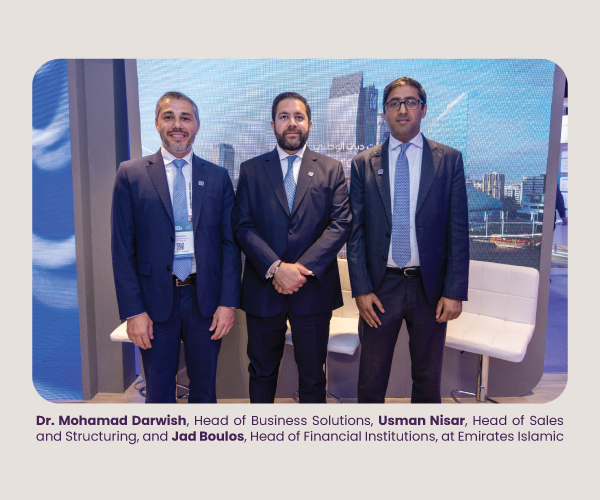Digital transformation and financial technology have impacted consumers in the way they access financial services. Offering a spectrum of benefits, Islamic Fintech strikes the perfect balance between cross-border accessibility and Shariah Compliance.
A panel discussion hosted by Emirates Islamic at the recently held Dubai Fintech Summit 2025 discussed the benefits of Islamic Finance Fintech and its ability to drive harmonisation across markets. The panel highlighted the impact of digital tools, such as AI in Islamic Fintech, to bring seamless integration among markets by implementing a common framework of regulations that supports ethical and purposeful cross-border Islamic Finance solutions.
Islamic Finance is ethical in nature and complements ESG initiatives as an intrinsic objective. Globally, the many positive attributes of Islamic Finance have rapidly increased assets in 2024, according to S&P. The GCC represents 81 percent of growth in Islamic Banking assets, with the UAE being the third largest Islamic Finance market in the world. With the approval of the “UAE Strategy for Islamic Finance and the Halal Industry” by the UAE Cabinet, the country is well placed to lead regulatory harmonisation. The expansion of Islamic Fintech can be well utilised as an effective strategy to this purpose, according to Dr. Mohamad Darwish, Head of Business Solutions at Emirates Islamic, and Moderator at the panel discussion.
As focus on innovation within the banking and finance sector continues, Fintech is now being embedded into Islamic Finance to offer customer-centricity in savings, investment, coverage schemes and financing products.
Jad Boulos, Head of Financial Institutions at Emirates Islamic Bank, commented that the bank’s approach to leveraging fintech-based solutions through collaboration with product partners has been instrumental in delivering the right products and services. Ranging from cash management, 24/7 payment solutions to Trade Finance and Structured Finance, these solutions have reinforced the bank’s leadership in the Islamic Finance market.
One of the main objectives of Islamic Fintech is to harmonise regulations within the region to enable cross-border financing opportunities and help individuals and businesses thrive. In contrast, harmonisation is a difficult proposition requiring alignment between regulators and market players within the financial system. This may seem time-consuming. However, the many use cases of Fintech emphasise its substantial relevance in harmonisation.
Usman Nisar, Head of Sales and Structuring at Emirates Islamic, highlighted the Emirates Islamic role in pioneering digital solutions including Fractional Sukuk, Equity, Gold Certificates, Islamic Global Funds and Alternative Investments. Usman also highlighted how Islamic Fintech has quickened the speed of remittances and implemented real time payments. He added that Fintech also reduces cost and adds greater efficiency, lowers investment barriers, broadens access to a wider pool of potential investors, simplifies documentation and promotes financial literacy among the population. This holistically builds an inclusive economy that is effectively working in harmony with the global economic ecosystem. The rise in Fintech also results in the expansion of Islamic Finance, appealing to broader audiences and ethical investors as well as younger generations worldwide, he said.
Usman shed light on how the group is investing in tools including API driven platforms, data science and advance analytics to capture new open banking opportunities. This provides Corporates, SMEs and Individuals with valuable services across their financial footprint.



